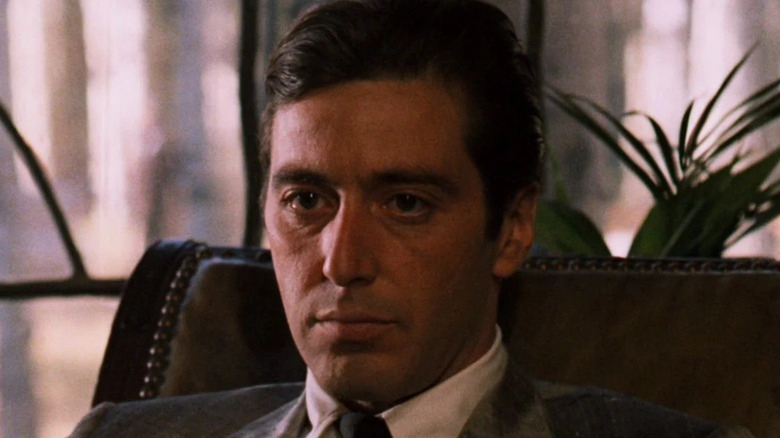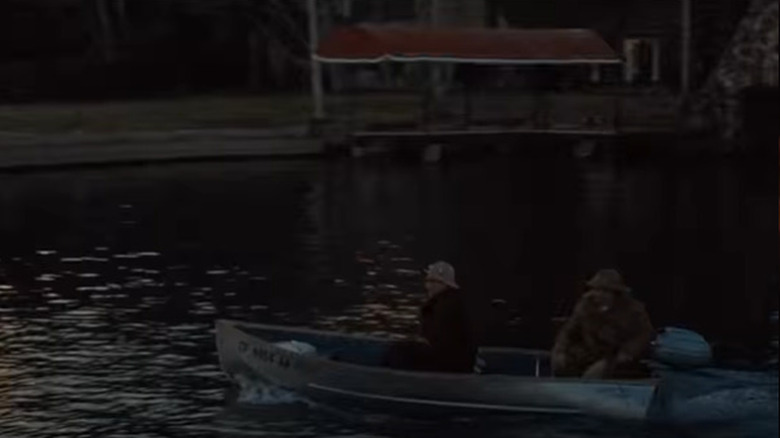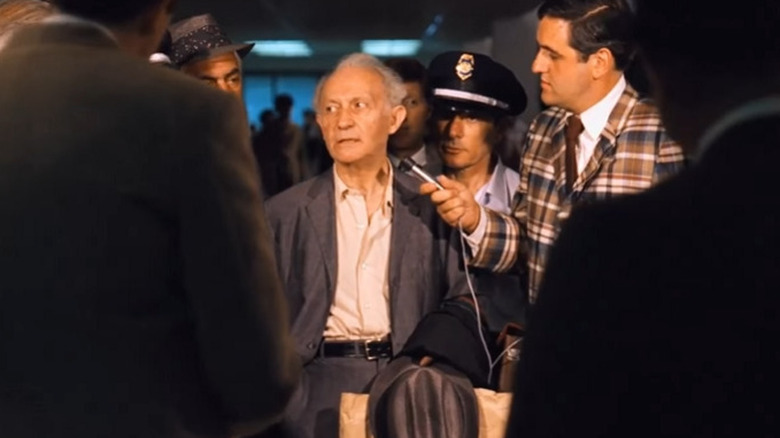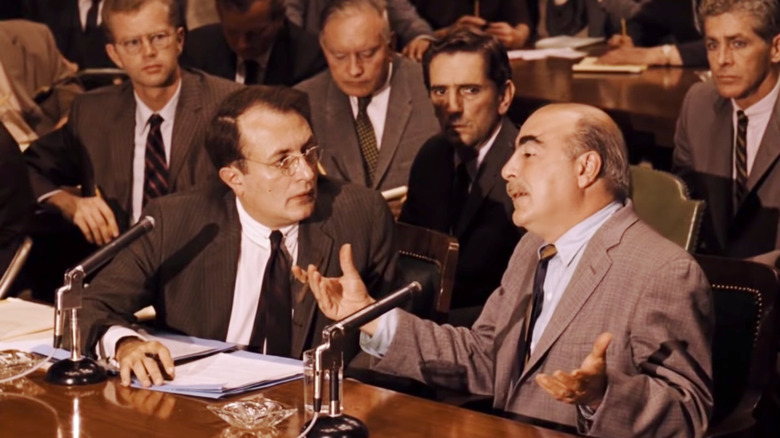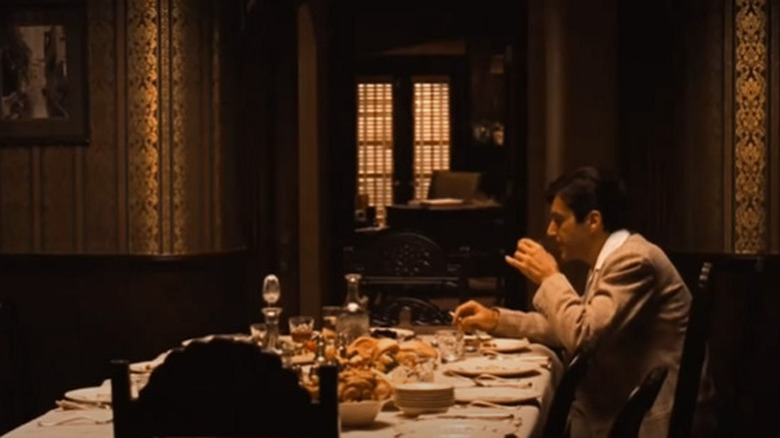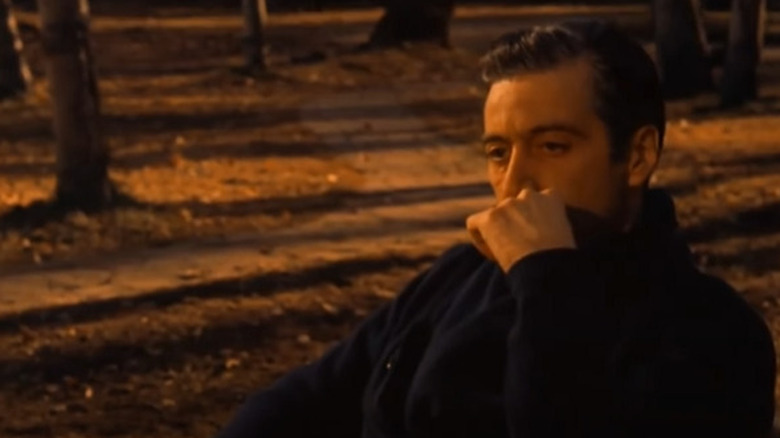The Ending Of The Godfather, Part II Explained
"The Godfather, Part II" is a rare sequel which equals (and some might say surpasses) the film which preceded it. Acclaimed by film reviewers and beloved by viewers, the performances of Al Pacino and Robert De Niro, among others, have gone down in the annals of cinema history, gaining a legendary reputation as time has passed.
The saga of the Corleone crime family would continue to develop, gaining a lukewarmly received film sequel, a video game midquel, and several novels from the pen of late author Mario Puzo, which fill in gaps that take place between events during the movie series. However, many viewers would argue that the "Godfather" saga peaks here, that it will never be able to improve upon the story of former-idealist Michael Corleone (Pacino) as his all-consuming quest for power. Journey with us as we explore the ending of this legendary piece of cinematic history and figure out who sleeps with the fishes and who was smart enough to leave the gun and take the cannoli.
The death of Fredo Corleone
The movie's denouement resembles that of the film-concluding montage in the original "Godfather," which, during the christening of Connie Corleone (Talia Shire)'s son, shows the bloody murders of Michael Corleone's rivals. The montage in the "Godfather: Part II" is even more ambitious, as it cuts between the present and the past, building ripples, echoing back to previous incidents and making a tragically cohesive whole.
The first major event within this ending is the death of Fredo Corleone (John Cazale), Michael's brother. Fredo had been shown over the "Godfather" and "Godfather II" to be a more easily malleable and accepting of his siblings, though not as passive as Connie is before her marriage. As Connie is transformed by Carolo Rizzi's physical abuse, so does Fredo change after falling under the sway of hitman Moe Green (Alex Rocco). Moe's influence allows Fredo to access layers of disappointment and bitterness, which have long been festering under the surface, and when he chooses Green over the Corleones near the end of "The Godfather," a rift between Michael and Fredo develops.
It widens as Vito selects Michael over Fredo to head the family in the wake of Sonny's death. Fredo subsequently betrays Michael by teaming with rival gangster and former ally Hyman Roth (Lee Strasberg), which prompts a federal indictment, and Michael soon ties this back to both men. Both brothers know that Fredo must pay for his betrayal with his life, and both try to avoid the inevitable with various delays.
Piety forms Fredo's ultimate response his murder: He's shot to death by Michael's assassin, Al Neri (Richard Bright), while he prays the rosary in a rowboat in the middle of Lake Tahoe during a fishing trip. Michael watches it happen, searching for absolution from a power even higher than his own.
The death of Hyman Roth
Roth, meanwhile, tries to flee America for sanctuary in Israel, only to be refused asylum and denied permanent entry to the country by ruling of its high court. Throughout the film, Roth has tried to project a sense of cool control, but here, he is defeated, slumped, jacket and paper bag in hand, quite aware of the fact that he has failed in his attempt at removing Michael in a grab for power. Cornered at Miami International Airport by the press and surrounded by a police escort, he declares that he went to Israel because "he wished to live as a Jew in the twilight of [his] life."
He doesn't mention that Israel would offer him protection against the Italian mobster he tried to bring down. Instead, the smooth charm he failed to use to quell Michael's questions earlier in the film comes to the surface once more. He holds court with the press, entertaining them, even making them crack up at his jokes, but his expression is one of knowing doom and uneasiness. He knows that Corleone will be out for blood, and now that he's stuck in America, there's no way out.
Roth's wariness does not protect him. The jokes end when Rocco Lampone, a Corleone cappo acting on Michael's orders, shoots Roth to death right in the middle of the airport with an eerie, almost rictus, smile on his face. Roth crumples backward in defeat, into the arms of the men and guards surrounding him. One of the policemen acting as an escort guns down Lampone in turn (he turns toward the man's shouts, as if accepting his bullet to the guts with pride). It's a story of acceptance and pride told in silent pantomime.
The death of Frank Pentangeli
This portion of the article discusses a character's suicide.
Another Corleone capo, Frank Pentangeli, meets an even sadder and more gruesome fate after betraying Michael.
Pentangeli initially tries to get Michael to assist him in defending his territory against aggression from the Rosato Brothers, who were working on the orders of their former business associate, Roth. When we first meet him at Anthony's first communion party, he seems both eager to please and a true believer in Michael's new regime, even obsequious. That goes sideways when Michael never provides Pentangeli with the firepower he needs to protect his territory. Pentangeli eventually offers to testify against Michael at his senate trial and is placed under witness protection.
Once again, family loyalty undoes one of Puzo and Coppola's characters. Michael forces Pentangeli to recant his testimony by taking his brother hostage. After the trial dissolves into chaos, Tom Hagen (Robert Duvall), the Corleone family's lawyer and adopted son, shows up at Pentangeli's compound to inform him in so many words that if he commits suicide as penance for speaking out against Michael at the trial, his family will be taken care of for life. Pentangeli subsequently slits his wrists in a bathtub – a dual display of love for his family and respect for Michael's authority.
If you or anyone you know is having suicidal thoughts, please call the National Suicide Prevention Lifeline at 1-800-273-TALK (8255).
The end of Vito's Story
Coppola's theme of familial sacrifice is solidly hammered home, thanks to a series of flashbacks which explore the early life of Michael's father, Vito (De Niro). In scenes that show us Vito's life in the early 1900s, we follow the young man to America after he flees Don Ciccio, the mobster who has killed his parents and brother in an act of revenge. If Michael's journey during "The Godfather" is about how his values and beliefs die off in the name of the mob's code of honor and pleasing his father, then Vito's story is about how opportunity combined with familial devotion and anti-immigrant sentiments to make a velvet-handed monster. Vito builds both a family and a criminal empire thinly covered by an olive oil importing business, and he eventually claims a violent revenge on Ciccio.
One final flashback to 1941 shows the Corleones as a happy family at a birthday dinner for Vito, as remembered by an exhausted and disgusted Michael after Fredo's murder. It is here that a much more idealistic Michael announces that he's quit college and joined the marines to fight for the Allied side during World War II. Tom and Sonny react negatively to the news. Both men have a stronger loyalty to their father and their country; Michael even points out that Sonny sounds like a clone of their father. Connie, meanwhile, tunes out the drama and eventually leaves the room entirely as Michael and Sonny nearly come to blows. Ironically, only Fredo supports Michael's plan to drop out. The family leaves Michael alone to brood at the dinner table while they rush to greet the newly-arrived Vito at the doorstep, while Michael takes a fortifying sip of wine.
Michael stands alone
The very last shot we see in "The Godfather: Part II" is a pensive, slow close-up of Michael Corleone as he sits outside at the family compound. Surrounded by autumn leaves and alone among the elements, he ought to be proud of his victory. He's beaten the rap the feds had against him, and he's eliminated all of his enemies. He is the unquestioned head of the Corleone family.
But in doing what he's done, he has lost his once-loyal brother. He has lost Kay (Diane Keaton), his wife, who so abhors the changes in him that she aborted their third child and lied that she miscarried while he was off in Cuba. Her vow to remove their children from the mob lifestyle will result in a divorce and have incredibly sad repercussions for both characters and their two children in the third film (and we will learn in the next movie that both Kay and Anthony knew that Michael ordered the hit on Fredo before the abortion took place). He has done ugly, ruthless things to protect himself — things that once made him sick to his stomach to contemplate — without even breaking a sweat. He has nothing left in his life but the trappings of wealth and power, and the business of being the head of the Corleone family: a position he never wanted in the first place, always meant for the family-loving but utterly ruthless Sonny.
With his intense, distraught expression, Pacino communicates one simple message — Michael has learned too late that a life lived without love is a life not worth living.
